Starting from:
$12.95
Home
Intell Espionage
CIA Project ARTICHOKE - Mind Control – “Manchurian Candidate" CIA Files - Download
CIA Project ARTICHOKE - Mind Control – “Manchurian Candidate" CIA Files - Download
CIA Project ARTICHOKE - Mind Control – “Manchurian Candidate" CIA Files
1,373 pages of CIA files related to Project ARTICHOKE, the CIA's 1950's human behavior control experiment and research program. Some material in this collection was not released until April 2018.
Jon Ronson, the author of "The Men Who Stare at Goats" wrote in his non-fiction work about more recent army experiments, described ARTICHOKE as, "Artichoke is the program that is not fun. Recently declassified documents reveal that Artichoke was all about inventing insane, brutal, violent, frequently fatal new ways of interrogating people."
The CIA's human behavior program originated in 1950 and was motivated by Soviet, Chinese, and North Korean use of mind control techniques. Beginning in the early 1950s, the CIA engaged in an extensive program of human experimentation, using drugs, psychological, and other means in search of techniques to control human behavior. The CIA program originated in 1950 under the name BLUEBIRD, which later changed its name to ARTICHOKE in 1951.
A 1975 CIA review of the program described it as, "ARTICHOKE is the Agency cryptonym for the study and/or use of 'special' interrogation methods and techniques. These 'special' interrogation methods have been known to include the use of drugs and chemicals, hypnosis, and 'total isolation,' a form of psychological harassment."
Project ARTICHOKE also known as Operation ARTICHOKE was run by the CIA's Office of Scientific Intelligence. The project went deeper into interrogation methods studied in the CIA's Project BLUEBIRD. ARTICHOKE offensive mind control techniques experiments attempted to induce amnesia and highly suggestive states in its subjects. ARTICHOKE focused on the use of hypnosis, forced morphine addiction, addiction withdrawal, along with other drugs, chemicals, and techniques.
One focus of the program was summarized in a January 1952 CIA memo, "Can we get control of an individual to the point where he will do our bidding against his will and even against fundamental laws of nature, such as self-preservation?"
A CIA document dated April 26, 1952, says Artichoke teams “used heroin on a routine basis” they determined that heroin “can be useful in reverse because of the stresses produced when they are withdrawn from those who are addicted to their use.”
One program experiment attempted to see if it was possible to produce a "Manchurian Candidate." In Richard Condon’s 1959 novel "The Manchurian Candidate" an American soldier, who has been placed into a hypnotic state by Communist forces, returns home to assassinate on command. Five years earlier the CIA considered the possibility. A January 1954 CIA report asks the question, “Can an individual of [redacted] descent be made to perform an act of attempted assassination involuntarily under the influence of ARTICHOKE?”
Later, the document stipulated that this assassination attempt would be “against a prominent [redacted] politician or if necessary, against an American official.” After “American official” there was a hand written asterisk. At the end of the document, next to another handwritten asterisk, the words “simulated only” were handwritten. According to the memo, CIA operatives would test this theory on a foreign national (his country of origin is redacted) who was once an Agency asset, but had since stopped cooperating
The report states:
“Access to the SUBJECT would be extremely limited, probably limited to a single social meeting. Because the SUBJECT is a heavy drinker, it was proposed that the individual could be surreptitiously drugged through the medium of an alcoholic cocktail at a social party, ARTICHOKE [presumably, hypnosis] applied and the SUBJECT induced to perform the act of attempted assassination at some later date. All the above was to be accomplished at one involuntary uncontrolled social meeting. After the act of attempted assassination was performed, it was assumed that the SUBJECT would be taken into custody by the [redacted] Government and thereby ‘disposed of.’ … Whether the proposed act of attempted assassination was carried out or not by the SUBJECT was of no great significance in relation to the overall project.”
A highlight in this collection is a 200-page ARTICHOKE glossary of terms, phrases, techniques and drugs used in the program.

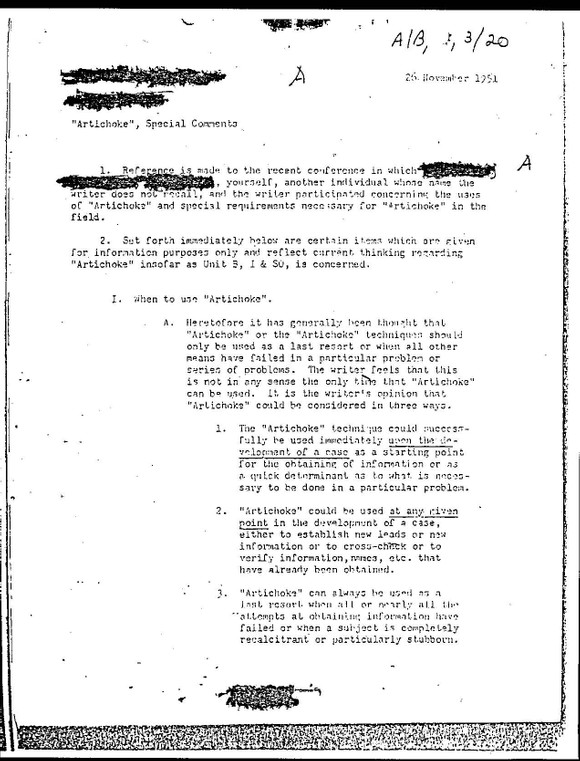
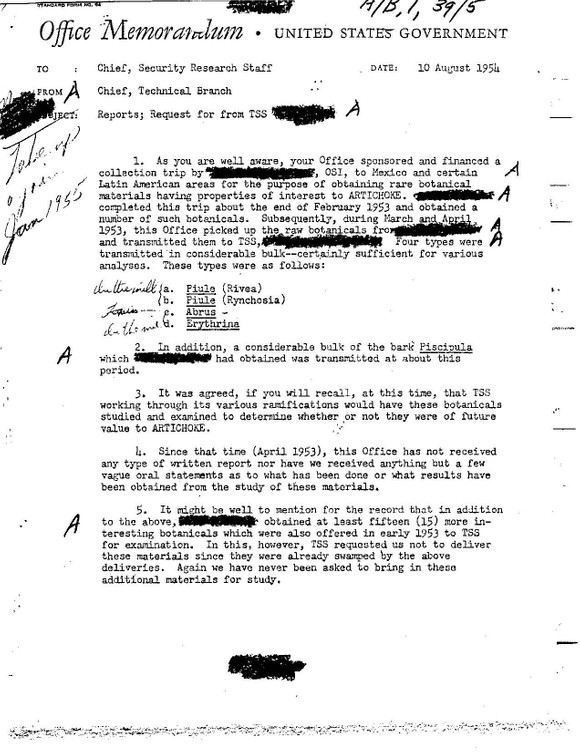
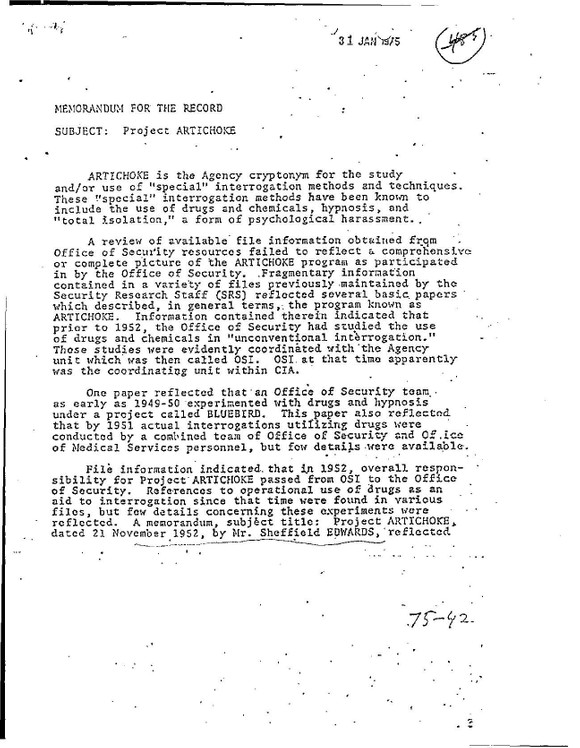
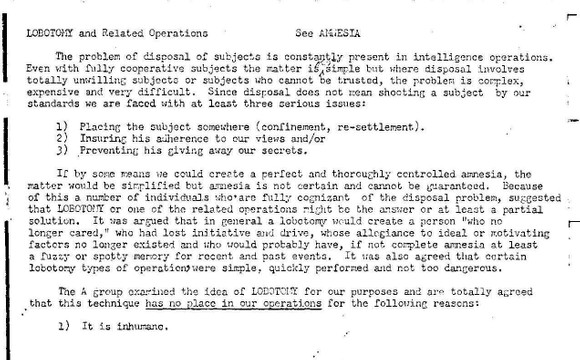
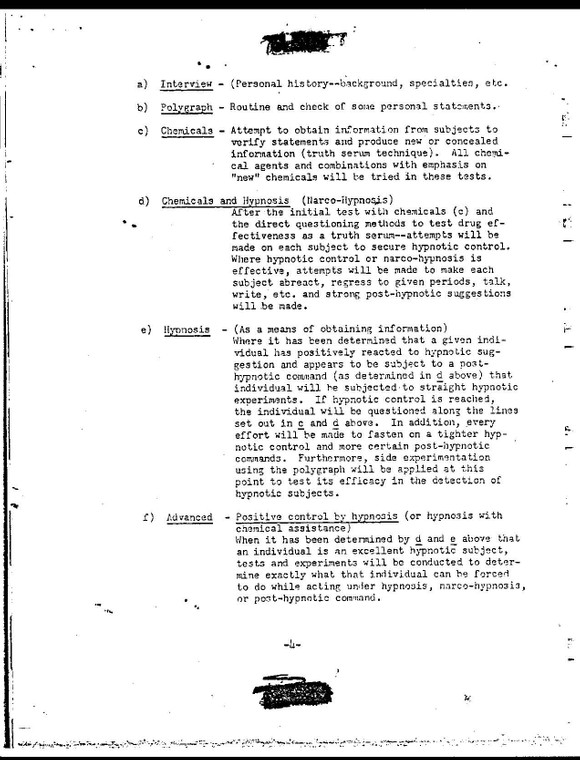
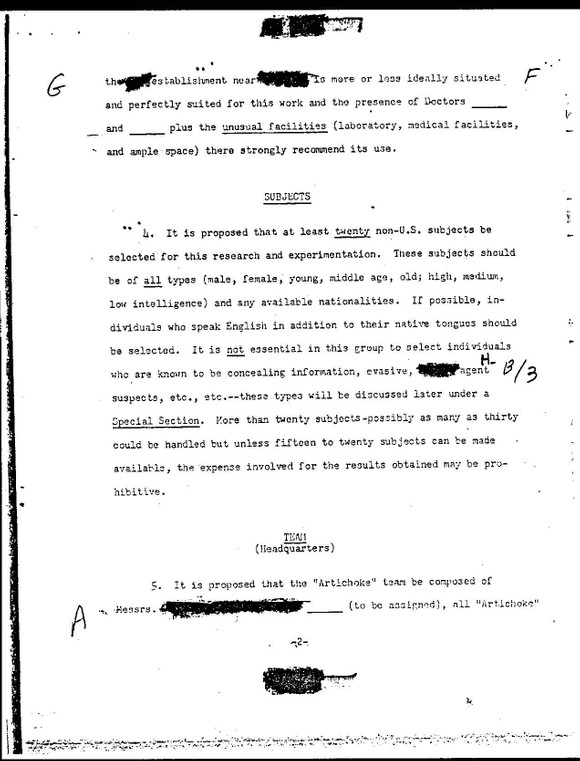
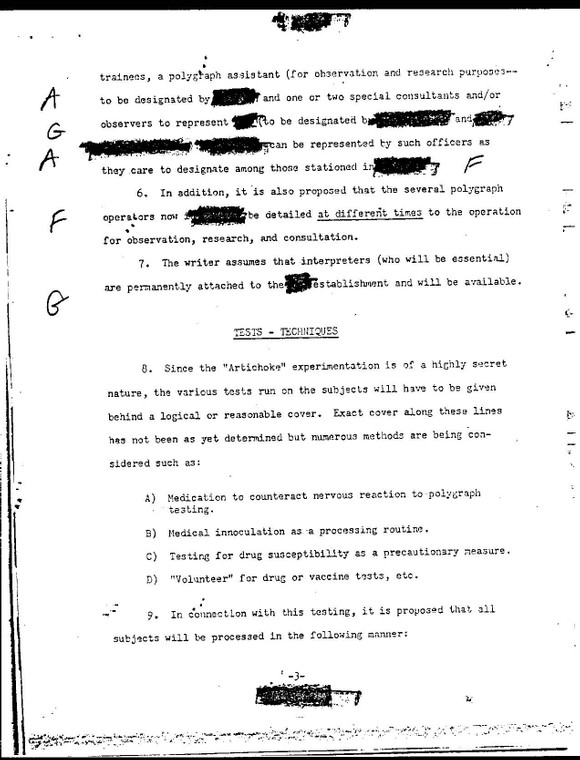
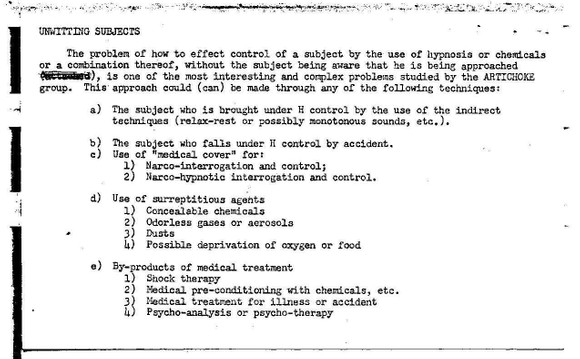
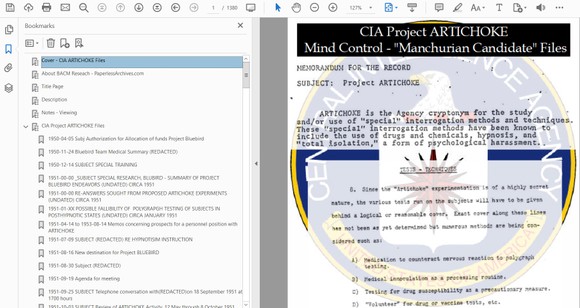


1,373 pages of CIA files related to Project ARTICHOKE, the CIA's 1950's human behavior control experiment and research program. Some material in this collection was not released until April 2018.
Jon Ronson, the author of "The Men Who Stare at Goats" wrote in his non-fiction work about more recent army experiments, described ARTICHOKE as, "Artichoke is the program that is not fun. Recently declassified documents reveal that Artichoke was all about inventing insane, brutal, violent, frequently fatal new ways of interrogating people."
The CIA's human behavior program originated in 1950 and was motivated by Soviet, Chinese, and North Korean use of mind control techniques. Beginning in the early 1950s, the CIA engaged in an extensive program of human experimentation, using drugs, psychological, and other means in search of techniques to control human behavior. The CIA program originated in 1950 under the name BLUEBIRD, which later changed its name to ARTICHOKE in 1951.
A 1975 CIA review of the program described it as, "ARTICHOKE is the Agency cryptonym for the study and/or use of 'special' interrogation methods and techniques. These 'special' interrogation methods have been known to include the use of drugs and chemicals, hypnosis, and 'total isolation,' a form of psychological harassment."
Project ARTICHOKE also known as Operation ARTICHOKE was run by the CIA's Office of Scientific Intelligence. The project went deeper into interrogation methods studied in the CIA's Project BLUEBIRD. ARTICHOKE offensive mind control techniques experiments attempted to induce amnesia and highly suggestive states in its subjects. ARTICHOKE focused on the use of hypnosis, forced morphine addiction, addiction withdrawal, along with other drugs, chemicals, and techniques.
One focus of the program was summarized in a January 1952 CIA memo, "Can we get control of an individual to the point where he will do our bidding against his will and even against fundamental laws of nature, such as self-preservation?"
A CIA document dated April 26, 1952, says Artichoke teams “used heroin on a routine basis” they determined that heroin “can be useful in reverse because of the stresses produced when they are withdrawn from those who are addicted to their use.”
One program experiment attempted to see if it was possible to produce a "Manchurian Candidate." In Richard Condon’s 1959 novel "The Manchurian Candidate" an American soldier, who has been placed into a hypnotic state by Communist forces, returns home to assassinate on command. Five years earlier the CIA considered the possibility. A January 1954 CIA report asks the question, “Can an individual of [redacted] descent be made to perform an act of attempted assassination involuntarily under the influence of ARTICHOKE?”
Later, the document stipulated that this assassination attempt would be “against a prominent [redacted] politician or if necessary, against an American official.” After “American official” there was a hand written asterisk. At the end of the document, next to another handwritten asterisk, the words “simulated only” were handwritten. According to the memo, CIA operatives would test this theory on a foreign national (his country of origin is redacted) who was once an Agency asset, but had since stopped cooperating
The report states:
“Access to the SUBJECT would be extremely limited, probably limited to a single social meeting. Because the SUBJECT is a heavy drinker, it was proposed that the individual could be surreptitiously drugged through the medium of an alcoholic cocktail at a social party, ARTICHOKE [presumably, hypnosis] applied and the SUBJECT induced to perform the act of attempted assassination at some later date. All the above was to be accomplished at one involuntary uncontrolled social meeting. After the act of attempted assassination was performed, it was assumed that the SUBJECT would be taken into custody by the [redacted] Government and thereby ‘disposed of.’ … Whether the proposed act of attempted assassination was carried out or not by the SUBJECT was of no great significance in relation to the overall project.”
A highlight in this collection is a 200-page ARTICHOKE glossary of terms, phrases, techniques and drugs used in the program.












1 file (69.5MB)



